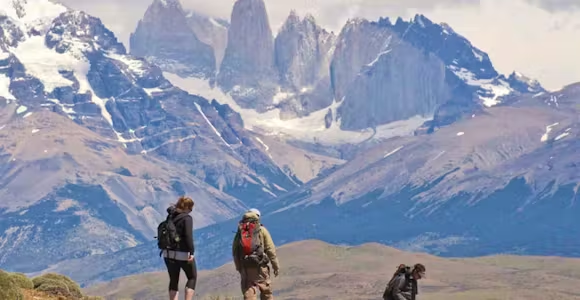
The W Trek in Torres Del Paine
The W Trek is Torres del Paine most famous hiking route, which can be walked in a variety of ways, from a multi-day trek to a series of day hikes.
Discover MoreDeep roots in Patagonia: We are ex-guides, tour leaders, outdoor enthusiasts, & adventurers.
We’ve got our feet on the ground: Impartial advice, a bespoke service, and at no extra cost.
For the ends of the Earth: Sustainability is more than our carbon footprint (but we’re reducing that too).

The Cerro Castillo National Park Trek (also known as the Horquetas Trek) may be the best multi-day trek in Patagonia you’ve never heard of. It takes you deep into the wilderness to craggy mountains vistas, glaciers and turquoise lakes, camping along the way – and all with barely another soul to share the astonishing landscapes with.
49.4km | 30.7 miles
4 days
Elevation gain: +7,577ft/2,309m
Elevation loss: -9,139ft/2,786m
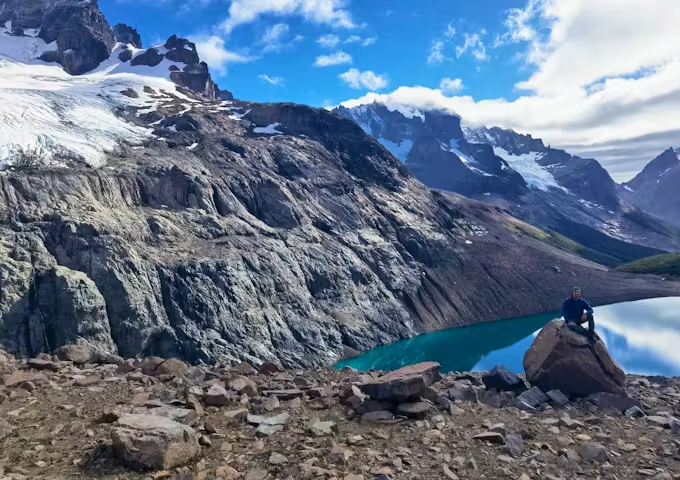
View of Lake Cerro Castillo

The Cerro Castillo Massif
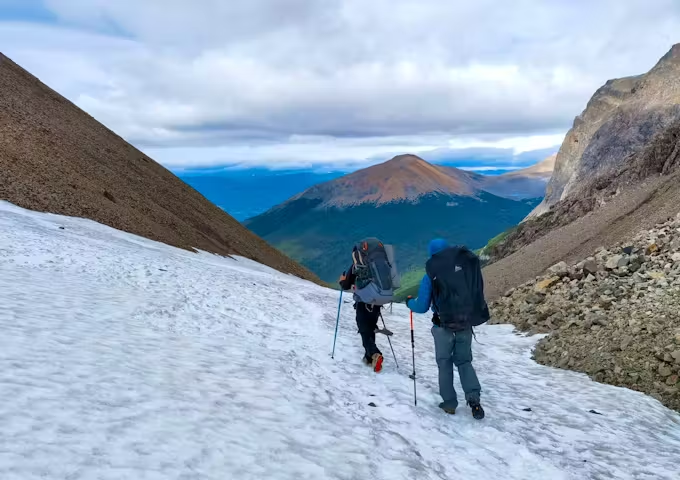
Crossing the Peñon Pass on the Cerro Castillo Trek

Views from the Morro Negro Pass

Duff Lagoon
Distance 10.6 miles (17 km)
Elevation 1312 ft (400m) ascent, 0 ft (0m) descent
The first day of the Cerro Castillo National Park Trek traditionally starts outside the park boundaries. The route follows an old logging road, passing small estancias and herds of cattle, until the old rancher’s fences disappear and you reach the office of CONAF, the national park authorities, at Las Horquetas: the trailhead proper where you sign in and enter the park.
The trail winds in and out of the forest, occasionally opening up for brief mountain views before disappearing into the trees. You follow a valley and make several river crossings – prepare to get wet, although it’s unlikely the water will come up to your knees.
Only in the last hour of the hike do you get the big reveal of what you are trekking for, when the great snowy ramparts of the Cerro Castillo massif reveal themselves as you climb to the edge of the tree line.
Home for the evening is the rustic Camp Turbio amid the trees.
Distance 7.5 miles (12 km)
Elevation 2910 ft (887m) ascent, 1883 ft (574m) descent
On the second day of the Cerro Castillo National Park Trek, the trail begins to steadily climb into the mountains. The first section follows the Turbio River through its valley, before you must lift your head and fix your gaze on Pẽnon Pass (4265 ft/1300m).
The ascent here is slow but steady, but the local geography means that there’s often snow here even quite late into the season. The descent is steep and on loose scree, and you’ll be torn between concentrating on your feet and the views as the route tracks close to the Peñon hanging glacier.
You’ll be able to stop at Laguna Tempanos, also known as the Iceberg Lagoon, fed by the glacier: as picturesque a spot for lunch as anywhere in Patagonia.
From here, it is a gentle downhill walk to Camp Bosque, where you’ll set up tents for the night.
Distance 5.6 miles (9 km)
Elevation 3727 ft (1136m) ascent, 2992 ft (912m) descent
The third day of the Cerro Castillo National Park Trek has the steepest climb of the trek, as you tackle the Morro Negro Pass (5577 ft/1700m).
The route takes you via one of the National Park’s gems: Lake Cerro Castillo, an azure lake surrounded by a ring of mountains and fed by hanging glaciers, and a wonderful place to linger.
After a picnic, the dry rocky climb to Morro Negro begins. The views when you reach the pass are incredible: a seemingly endless panorama of peaks, lakes and glaciers. As you see the mountains in the distance get lower, browner and snow-free, you’ll know that you’ve mentally crossed the invisible border into Argentina.
From here, it’s a fairly continuous descent along scree until you reach Camp Porteadores camp near the river.
Distance 6.2 miles (10 km)
Elevation 935 ft (285m) ascent, 2838 ft (865m) descent
The final day of the Cerro Castillo National Park Trek has you leaving your gear at the campsite to walk to a slightly higher campsite at Camp Neozelandes. This offers amazing views of the north face of the Cerro Castillo massif and its glacial basin. It’s an easy diversion from here to walk to Laguna Duff, another beautiful glacial lake.
From here you’ll follow an easy and steady descent through light and open lenga forest, with constant views of the mountains. It’s a relatively short walk to arriving back at Camp Porteadores to pick up your pack.
The trail continues through open country until you reach the limits of the national park. If you don’t have your own transportation you’ll need to walk the rest of the way to get back to Villa Cerro Castillo, otherwise you can rest your legs as you take a transfer back to your accommodation for a shower, a change of clothes and a celebratory meal.
Completing the Cerro Castillo Trek shouldn’t be the start and finish of your Aysen experience. The mountains are well placed to go on and explore the Marble Caves, Laguna San Rafael and even Patagonia National Park.
When on the Cerro Castillo Trek you'll be carrying your personal gear, sleeping bag, mat and your daily trail snacks and water, so bring a suitably-sized backpack: we recommend a 50-60 litre rucksack. You'll need a sleeping bag rated for 10F (-12C) and an inflatable sleeping mat. Tents are provided if you book with Swoop; you may be asked to carry part of the camping equipment.
Dress for four seasons in a single day, with a windproof and waterproof jacket and warm layers including a warm hat, neck gaiter (buff) and windproof gloves. Waterproof hiking boots that support your ankles are a must, plus sandals for river crossings. Trekking poles are strongly recommended
Trekking gear is available to buy in Coyhaique, 90 minutes from the park (59 miles/95 km).

The Cerro Castillo National Park Trek is aimed at those with a good level of physical fitness, ideally for those who have done at least one multi-day trek before.
Although the route is not technical, you’ll need to be prepared to carry a heavy rucksack over changeable and often rocky terrain under a variety of different (and often harsh) weather conditions. Although none of the ascents are particularly steep the Peñon Pass can involve hiking in snow as late into the season as February, while the descent from Morro Negro Pass is quite sharp, and often on a surface of loose scree.

There are three campsites on the Cerro Castillo National Park trek, and all are fairly basic. They have simple shelters for preparing meals and long drop toilets: this is proper back country trekking.
Your guide and porters will carry the food you'll eat and tents, though sometimes you may be asked to carry some of the camping equipment. If you are self-supported, a camping stove is a mandatory piece of kit; campfires are not permitted. Water is taken from deliciously pure glacial-fed streams.
The entire trek operates on a strict Leave no trace principle, so you must carry all waste out with you from the trek.


The W Trek is Torres del Paine most famous hiking route, which can be walked in a variety of ways, from a multi-day trek to a series of day hikes.
Discover More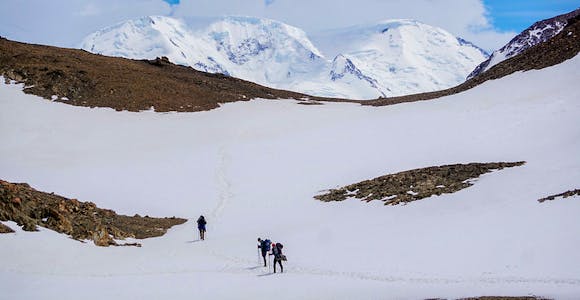
Our ultimate guide to the Huemul Circuit trek in Los Glaciares, from planning and preparation to a day by day itinerary on the trail.
Discover More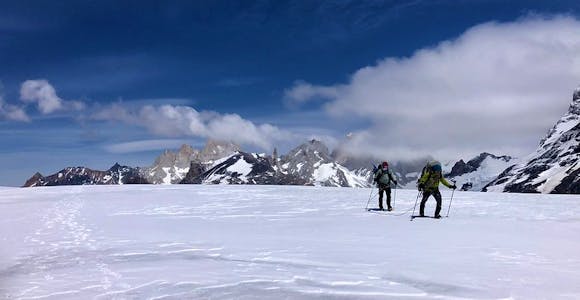
Our ultimate guide to the South Patagonian Ice Field Expedition in Los Glaciares, from planning and preparation to a day by day itinerary on the trail.
Discover MoreWe'll spend some time listening to your aspirations, then discuss the kind of experience that might suit you.
Next we'll discuss the options, shortlist the best trips for you and present you our impartial recommendations.
We'll place a 24 hour hold on your preferred option - without obligation - whilst we talk through the details.
This website uses cookies to ensure you get the best experience on our website. Privacy policy